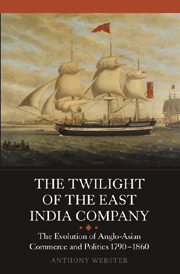 The Twilight of the East India Company
The Twilight of the East India Company Book contents
- Frontmatter
- Contents
- Preface
- 1 Introduction: The end of the East India Company, the historians and the evolution of Anglo-Indian commerce and politics
- 2 The origins of the East India Company and the rise of non-Company commercial interests in Britain, India and Asia, 1600–1793
- 3 War, politics and India: The battle for the East India Company trade monopoly, 1793–1813
- 4 Accommodating free trade: India, the East India Company and the commercial revolution of 1814–1830
- 5 Crisis and trade liberalisation 1830–1834: Financial chaos and the end of the East India Company's commercial role and privileges
- 6 Re-ordering Anglo-Asian commerce and politics: 1833–1847
- 7 Crisis, the resurgence of London and the end of the East India Company: 1847–1860
- 8 Conclusion: The decline of the East India Company and the evolution of British commercial and political interests in Asia, 1793–1860
- Notes
- Bibliography
- Index
8 - Conclusion: The decline of the East India Company and the evolution of British commercial and political interests in Asia, 1793–1860
Published online by Cambridge University Press: 12 September 2012
- Frontmatter
- Contents
- Preface
- 1 Introduction: The end of the East India Company, the historians and the evolution of Anglo-Indian commerce and politics
- 2 The origins of the East India Company and the rise of non-Company commercial interests in Britain, India and Asia, 1600–1793
- 3 War, politics and India: The battle for the East India Company trade monopoly, 1793–1813
- 4 Accommodating free trade: India, the East India Company and the commercial revolution of 1814–1830
- 5 Crisis and trade liberalisation 1830–1834: Financial chaos and the end of the East India Company's commercial role and privileges
- 6 Re-ordering Anglo-Asian commerce and politics: 1833–1847
- 7 Crisis, the resurgence of London and the end of the East India Company: 1847–1860
- 8 Conclusion: The decline of the East India Company and the evolution of British commercial and political interests in Asia, 1793–1860
- Notes
- Bibliography
- Index
Summary
THE GREAT INDIAN REBELLION of 1857 and the termination of East India Company rule over India just a year later thus ushered in a new phase of British imperialism in Asia. The end of the Company's regime meant that, at last, the British state had to accept unequivocal responsibility for the governance of former Company possessions. Consequently, new governing institutions were established in Asia which were directly answerable to government and Parliament in London, through the Secretary of State for India and the India Office. These changes went hand-in-hand with a new culture of governance, created by the trauma of the Rebellion. Military reforms resulted in a shift away from Hindustan as the main recruiting ground for the Indian army towards the Punjab and other regions from which troops were perceived to have shown greater loyalty to the British. The policy of undermining Indian law, culture and involvement in the machinery of government, which had been applied under the last few decades of Company rule, was abruptly reversed. An initiative was launched to recruit educated Indians into the lower ranks of the Indian Civil Service. The Straits Settlements, which for so long had complained about their poor status under Company rule, were eventually granted Crown Colony status and placed under the jurisdiction of the Colonial Office. Perhaps the most telling changes were the economic consequences of the new arrangements. The new regime, underpinned as it was by the state, restored the confidence of British business, encouraging a flood of capital into India, in railways and plantation agriculture. The financiers and investors of the City of London were major beneficiaries of this process, and, according to Cain and Hopkins, probably the main determinants of later economic policy.
- Type
- Chapter
- Information
- The Twilight of the East India CompanyThe Evolution of Anglo-Asian Commerce and Politics, 1790–1860, pp. 151 - 164Publisher: Boydell & BrewerPrint publication year: 2009


